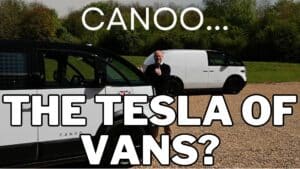Big vans weigh a lot. Big electric vans weigh even more meaning that your standard 3500kg GVM van doesn’t have much payload left once the weight of the battery pack and drivetrain are taken into account. Enter stage left, the government’s derogation allowing individuals with a Category B (car) driving licence to drive an electric van with a GVM of up to 4250kg. This instantly adds the best part of 750kgs to the available payload making a large electric van a much more attractive and practical proposition.
Any euphoria was short-lived once the details below the headline were digested. Drivers would need to undertake 5 hours of additional training before being allowed to take to the road. Not a deal breaker at all, but many considered this to be unnecessary. Then, more serious questions were raised. Would the van need a tachograph? A speed limiter? Would the goods vehicle drivers’ hours regulations apply? If travelling further than 100 km (62 miles) away from base, would the driver need a CPC (Certificate of Professional Competence)? And what about towing? The derogation doesn’t allow it. The answers to many of these questions have still to be clarified, a situation untenable when manufacturers are under so much pressure to increase their electric van sales.
Last year, the government announced that it would scrap the training requirement, and also reconsider the towing restriction. However, the revised legislation has yet to be approved by parliament and, well, with the election in the offing who knows how long it will take. Customers need to know for sure just what the implications are when operating a 4.25t electric van and the uncertainty has seen some fleets cancel their orders. Mercedes-Benz has just launched the new eSprinter (a cracking van, check out our video review), at 4.25t with a perfectly adequate payload for most, but not when plated at 3.5t. Let’s release the shackles that large electric van manufacturers are being held back by. Let common sense prevail and allow the van operator to carry the same payload as he or she is in their current diesel van but without restrictions that would appear to be unwarranted.
Rumours and News
Not content with its recently announced agreement with Hyundai to market an electric chassis cab, Iveco has signed a Memorandum of Understanding with Chinese manufacturer Foton. At present, the agreement is to ‘explore potential collaboration in areas of EVs’, with the potential for the Italian company to market products under the 3.5t GVM threshold. Iveco seems to be committed to the electric LCV and joint ventures such as this may well open up new markets. Fair play to them for being proactive.
Possibly the most anticipated electric van launch this year is the Ford E-Transit Custom and last month Ford Pro provided the UK media with a first chance to drive the van in Germany in May and, whilst we were unable to attend ourselves, we have heard first-hand from an industry friend that the van doesn’t disappoint in any area. Granted, the range of 209 miles isn’t class-leading but even taking off a decent allowance for payload, temperature etc. there’s more than enough for the vast majority of medium van users to complete at least one full day’s work. Payloads of just under 1000kgs, electric motors producing 135PS or 217PS (and even a daft 285PS if you opt for the sporty MS-RT version), an excellent cab design and a van that looks great from the outside – what’s not to like?




